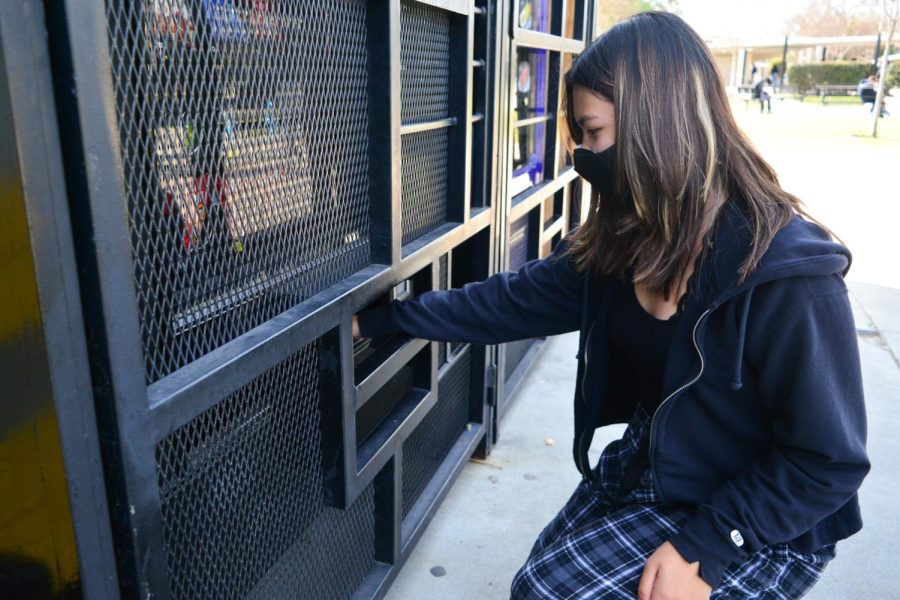Some students were disappointed upon finding out last week that school officials had initiated the implementation of timers on the campus’s three snack and three beverage vending machines — prohibiting purchases during certain class times.
“I see why they put the implementation, but I also do not agree with it,” said senior Arianna Amirthiah, who uses the snack machines at least once a week during her Period 3 class. “When a student is hungry, they should be able to get food when needed.”
Campus supervisors called on Continental Vending Inc. to only allow the machines to work from before the school day to the end of Period 1, during break and from lunch onward, campus supervisor Leslie Rains said.
Starting Feb. 22, the screens read: “NO SALES UNTIL 11:02AM” during periods two and three and “NO SALES UNTIL 01:24PM” from the end of break until the start of lunch.
Rains also said the restrictions were put in place because too many students were found roaming around campus and talking with friends after purchasing snacks.
Some teachers also started calling the office, asking if campus supervisors could be contacted to look for their students who had originally asked to use the restroom.
“We have seen a mass improvement of students staying in class and not hanging out at vending machines,” Rains said.
Amirthiah’s Period 2 teacher, Jennifer Papageorge, said she was concerned that school officials didn’t inform anyone about this change, adding that these new restrictions could create potential problems for diabetic students.
“There should have been a little announcement or something sent out,” Papageorge said. “Then people who depend on the vending machines for food at certain times would be aware.”
Sophomore Darin Keungmanivong agreed.
“I was pretty upset and kind of disappointed,” said Keungmanivong, who usually gets food during his fourth period class.
Meanwhile, students are beginning to adjust to this change.
“I’m planning on bringing my own snacks now since the new restriction gave me the motivation to be healthier with what I eat for my snacks,” said Amirthiah, who expected declining sales for snacks and beverages because of the new restriction.
Since the implementation of timers on the three snack and three beverage vending machines, prohibiting purchases during class times, students accepted the decision but still expressed disappointment.
“I see why they put the implementation but I also do not agree with it,” said senior Arianna Amirthiah, who uses the machine at least once a week. “When a student is hungry they should be able to get food when needed.”
Amirthiah,who took the time during class to compensate for skipping breakfast, said that she felt confused when she read the sign and realized the machine was unavailable during her third period class, Advancement Via Individual Determination [AVID].
“It was a routine for me to go and get things [from the vending machine], so it was weird to see the sign,” Amirthiah said. “I had to tell my friend who was going to get something, and she was really disappointed because she was hungry.”
She admits she will not visit the dispenser as often because she finds it ineffectual to wait in long lines during break and lunch.
“Honestly, I’m planning on bringing my own snacks now since the new restriction gave me the motivation to be healthier with what I eat for my snacks,” said Amirthiah, who sees both the benefits and downsides of this new implementation. “[However,] when a student is hungry, they should be able to get food when needed.”
She expects sales from the snack and beverage machines to decline but sees potential success in keeping students from missing class.
Amirthiah’s AVID teacher Jennifer Papageorge feels the restriction would only create potential problems for diabetic students. Otherwise, she advises students to purchase during break or lunch or bring their own snacks.
“There should have been a little announcement or something sent out [to inform of the change],” said Papageorge, who was not one of the teachers who sent complaints about this issue. “Then people who depend on the vending machines for food at certain times would be aware.”
This permanent change of applying timers to vending machines, made by the external company Continental Vending Inc., started after supervisors found students roaming and talking with friends after purchasing snacks and received calls from teachers looking for students who stayed in the “restroom” for an unusually long time, campus supervision aide Leslie Rains said.
“We have seen a mass improvement of students staying in class and not hanging out at vending machines,” Rains said. “This absolutely makes it easier to get other tasks at hand completed. Teachers don’t have the constant interruptions of students coming and going, and then managing the time students are missing.”
The screens read “NO SALES UNTIL 11:02AM” during periods two and three and “NO SALES UNTIL 01:24PM” from the end of break until the start of lunch.
Before the new limitation, campus supervisors constantly sent students back to class after visiting vending machines, which took away time from other needs such as delivering summons, gathering students from class and assisting administration, Rains said.
“Through this change, we hope to keep students in class, maintain less disruptions in classrooms with students coming and leaving and also control the mess students leave behind with trash,” she said.





